Charoset for Passover
I’m writing a short-ish post this week, since that’s all I have time for—too much going on with my dissertation right now!
(And, as I mentioned last week, I guess I’m still not willing to sacrifice time spent on cooking, so something else had to give…)
Simply put, charoset is the main reason I love the Passover holiday: chopped apples, walnuts, dates, and wine, with a little cinnamon sprinkled in. It’s quite sweet, but still somehow manages to be addictive and refreshing.
Charoset recipes often call for the super-sweet Manischewitz wine. (I’m pretty sure my parents have a bottle of this wine, which I believe is used once a year. For charoset.)
I prefer to just use whatever red wine we probably already have open, along with extra dates for sweetness, or better yet, a little pomegranate molasses.
I love the tangy sweetness of pomegranate molasses, and a little here goes a long way.
You can also adjust the amounts of dates and walnuts for a slightly different balance of flavors. Or use other kinds of nuts (like almonds), or dried fruit (like raisins or figs).
I prefer charoset made with dates, as long as they’re diced or pureed very finely, since I tend to find whole Medjool dates too sweet on their own.
Charoset is an essential part of any Seder (Passover dinner), and it’s usually eaten smeared over matzah. Since it represents the mortar the Jews used to bind bricks in Ancient Egypt, it’s actually supposed to look like mortar, too, i.e., pureed to a smooth paste.
The smooth paste version of charoset is, not surprisingly, the easiest kind to make, but it’s also, not surprisingly, not that photogenic… So I’ve made a chunkier version here, which takes a little more effort but is nicer to look at, and still tastes almost as good.
(After having made a batch of each in the past two weeks, I’ve been reminded that I actually like the taste of the completely pureed version better!)
So if I’m just planning to snack on it throughout the week (dissertation fuel!), then I’ll blend it into a paste in the food processor. But if I’m making it to serve dinner guests (or for my blog readers!), then I’ll consider dicing about half of the apples by hand for the chunkier consistency that looks a little nicer on camera.
(Keep in mind that dicing some of the apples will lead to a larger volume of charoset, which might also benefit from a little extra wine, dates, and pomegranate molasses. The volume will really decrease if you blend it all into a paste—down to only about 2 cups. In that case, you won’t want to add as much wine since you’ll have released so much liquid from the apples, and you might want to start with less pomegranate molasses and fewer dates, since all of that sweet apple flavor will already be so concentrated.)
I almost feel like I’m cheating this week, posting yet another dish that I consider to be just a non-recipe/elaborate snack, but this is a childhood favorite of mine, so maybe it’s about time that I shared it with you!
Print this recipe. (PDF)
RECIPE:
Charoset
(Makes 2-5 cups, depending on whether you process or dice the apples)
Active and Total time: 10 minutes for smooth charoset, 25 minutes if dicing some of the apples by hand.
Ingredients:
~ 4-5 medium apples (3-4 sweet like Fuji, 1-2 firmer & tart like Pink Lady)
~ 5-10 Medjool dates, pitted (depending on how sweet you want it to be)
~ 1/4 cup walnuts (about 10 shelled whole walnuts), or more to taste
~ 3-4 Tbsp. red wine
~ 1-2 Tbsp. pomegranate molasses
~ 1 tsp. ground cinnamon
Special equipment needed:
~ food processor
How to make charoset as a smooth paste:
1. Peel the apples, roughly chop them, then add all ingredients to the food processor (start by adding only 2 Tbsp. wine and 1 Tbsp. pomegranate molasses, then add more later if it needs more moisture or sweetness). You might need to wait and add the apples in stages to fit them all in. Pulse everything until you have a smooth, spreadable paste. Refrigerate for up to a week (it tastes even better on the second day) and enjoy with matzah. (This will make about 2 cups.)
How to make chunkier charoset:
1. Peel the apples. Roughly dice 2 of the apples and add them to the food processor along with the dates, walnuts, 2 Tbsp. of the wine, 1 Tbsp. of the pomegranate molasses, and the cinnamon. Pulse until everything has been very finely diced (and it becomes paste-like), adding more wine if necessary.
2. Using a knife, finely dice the remaining 2-3 apples by hand, tossing them into a large bowl. As you dice the apples, also add some of the paste from the food processor into the bowl of diced apples and mix together.
3. Taste and add more pomegranate molasses if it needs more sweetness, or more wine if it seems dry. If it’s too chunky and not easily spreadable, return about a cup of the charoset to the food processor and pulse until smooth, then stir that back into the big bowl. Refrigerate for up to a week (it tastes even better on the second day) and enjoy with matzah. (This will make 4-5 cups.)
Print this recipe! (PDF)
Related recipe posts:
 |
 |
 |
 |
| Asparagus Salad with Preserved Lemon Dressing and Passover Potatoes | Skillet Cranberry Apple Crisp (Gluten-Free) | Almond Cinnamon Baklava | Muhammara and Roasted Red Pepper Hummus |



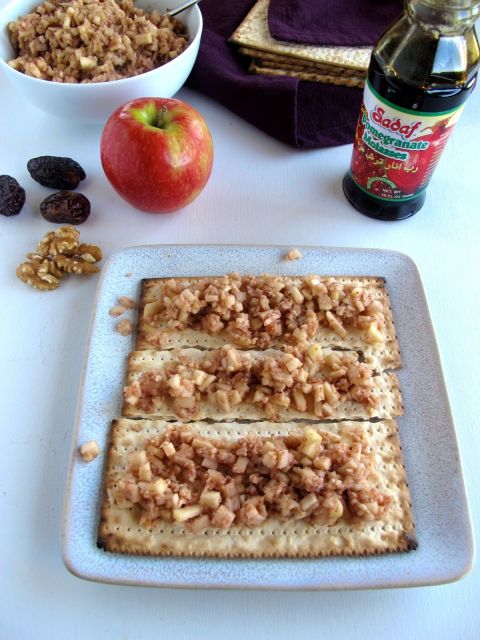

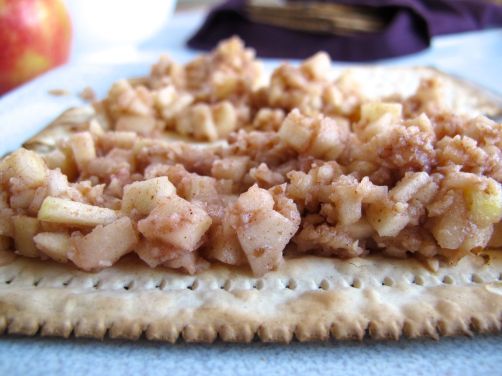
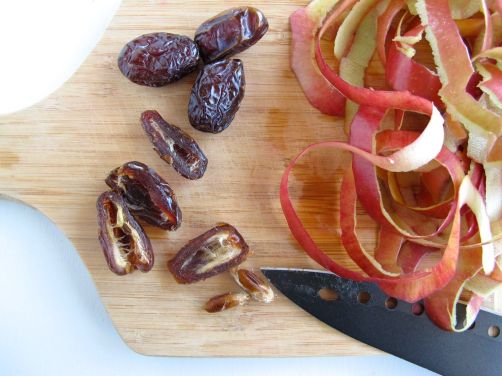



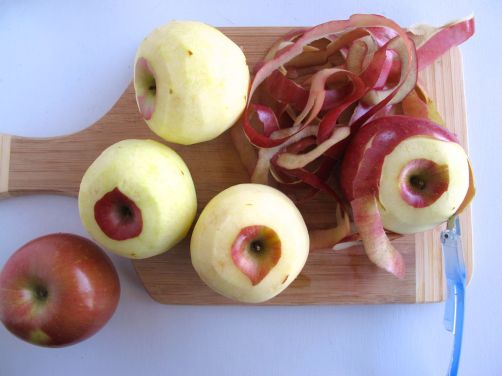

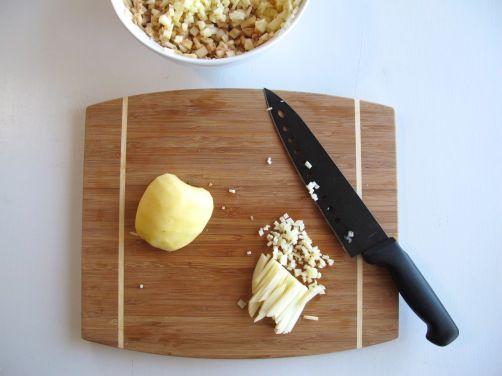
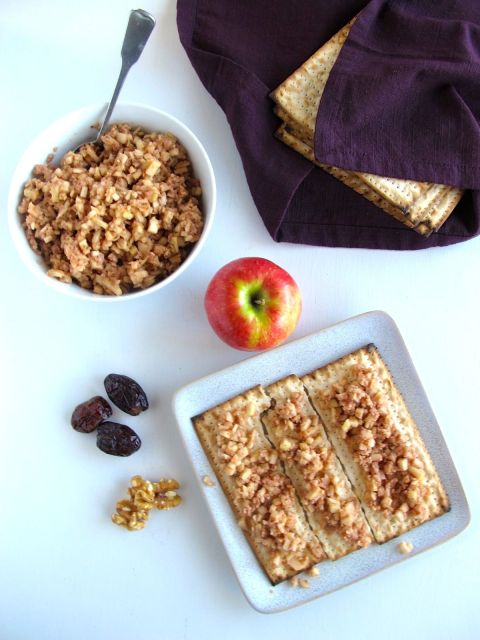
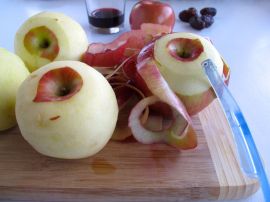
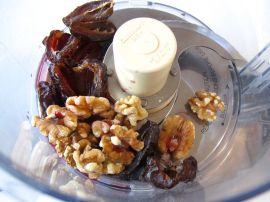
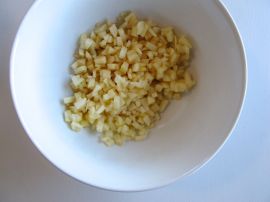
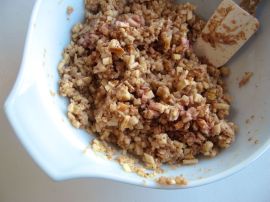

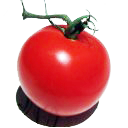









Apples, dates, Pom molasses, it really does look like festival food x
Yes, it’s definitely a treat! (And every year around Passover I wonder why I don’t remember to mix up batches of charoset during other times of the year, too…)
I love charoset!!! I love that you added pomegranate molasses. YUM.
Thanks, Amanda! I love it, too! I’m aware it might look unappealing to people who have never had it, but it is really SO good, especially once it’s been sitting in the fridge overnight!
It’s by far my favorite thing on the Passover table. It’s sweet and spicy, but refreshing!
Mine, too! (Which is why I eat it off the Passover table, too… it’s my favorite snack all month long around this time of year.)
I don´t know this dish, but reading the list of ingredients it can only be delicious!
Yes, exactly! Thanks, Sabine! I was hoping I’d get some comments like that. :)
In the unprobable case that there will be a little something left, save it for me !!
Will do! :)
MY ABSOLUTE FAVORITE! My Mom never used dates or molasses…can’t wait to try it!
Yay! I hope you like it! (Did your mom use raisins instead of dates?)
Yep raisins and pecans…it was a slightly more southern version haha
Oo, pecans in charoset sounds good—I’ll have to try that!
I was just looking for another way to use my pomegranate molasses so this is a great idea.
Awesome! I love pomegranate molasses—I’m always looking for more ways to use it!
I agree. Charoset is the best thing about Passover! Yummmy! I love the pomegranate molasses, dates, walnuts and cinnamon in your (dare I say perfect?) version. I sometimes add soft, plump Turkish figs along with the dates, which is a nice twist, along with a touch of orange zest. Amazing photos, Allison – and good luck on your dissertation!
Thanks, Shanna! Figs and orange zest both sound delicious in charoset. I’ve heard of figs being used but I don’t think I’ve ever thought of adding citrus zest! (I almost added a little lemon juice to keep my apples from browning too much for the photos, but then I worried it would make it too tart, and anyway, charoset is supposed to turn brown-ish with all that red wine and cinnamon!)
Love this recipe! I litterally only discovered charoset last month – I had never even heard of it. A friend of mine bought back a little jar from Israel (which inspired my last post). And now here you are making charoset – crazy!
Thanks! Wow, good thing you discovered it in time for Passover! :) Although really it’s good any time of the year. Your friend brought a jar of it back from Israel? I’m so curious how a jar of it could have kept well without refrigeration… was it somehow canned/preserved?
Beautiful pictures! All looks amazing
Thanks, Zoe!
I made a big batch of the hand-chopped variety yesterday (with almonds, dates, and raisins). I used to prefer the taste of the more pureed version, but now I really do prefer it chopped. Maybe I’ve just adapted to life without a food processor. :)
Nice! Yeah, I definitely prefer the look of the hand-chopped version, and I like the taste of both (especially after it’s sat in the fridge overnight). Maybe I just like the pureed version more because it’s the one I remember from when we were little… or because it seems sweeter and spreads better? Who knows!
I’m impressed with how well you’ve adapted to life without a food processor! We use ours super often… I wish we lived closer to each other so we could start up our very own food processor & stand mixer exchange program!
This looks divine!
Thanks! It is… it’s definitely one of my favorites. :)
I would love to try this dessert it seems so classy with its red wine and all :)
Cheers
Choc Chip Uru
Thanks, Uru! I never thought of charoset as classy before! (Especially since the totally pureed version really resembles the brick mortar paste that it’s supposed to symbolize…) It’s definitely tasty, though! :)
I’m impressed with all of the fantastic recipes you have from many different cultures. Do you come up with these recipes yourself or do you find them online?
Thanks; that’s a good question. Charoset is a traditional dish for the Jewish holiday of Passover, and since I’m Jewish, it’s one that I grew up with. And (as it says on the “about” page), I’ve lived in Japan, Spain, and Korea, and I learned a little about the food in each of those places, so some of my dishes are either inspired by those cuisines, or just my (pretty unoriginal) versions of classic dishes from those countries. As for recipes from other cultures, I’ve done a lot of traveling, restaurant-eating, cookbook-collecting, cookbook-reading, and food blog-reading, and tried to learn as much as I can about different ingredients, cuisines, and cooking methods in order to reproduce dishes I love at home.
So some of my recipes are based on specific ones from blogs or cookbooks (and then I attribute them to the source right below the recipe title), and others I’ve just made up or really adapted into my own version from making them so often.
Basically, I just really love traveling and eating, and even though I can’t afford to travel much, I still want to be able to enjoy a variety of good food (that’s more affordable than restaurant food) at home! :)
I’ve never heard of this before!!!! I must try this. Thanks for sharing. Yum….
Thanks for commenting! I was hoping that some people would newly discover charoset if I posted this recipe. :)
charoset has been on my list of “to makes” FOREVER, mostly because i love every single ingredient contained in it: i feel like i’m missing out on a total comfort food! i had zero idea about what it was symbolic of, although i suppose i knew it had to stand for something. absolutely will be trying this at some point.
best wishes for you dissertation, Allison! hang in there. :)
Yes, Shannon—you should make it! It is total comfort food (+ healthy-ish snacky food, all wrapped into one). Nearly everything on the Seder table is symbolic of something, but I’d probably fail a pop quiz on what they all stand for, other than charoset. :)
Thanks for your encouragement! (Like you write about often, it’s wonderful to have a virtual support network of food blog friends!)